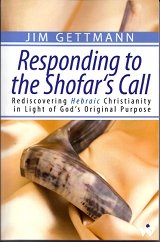Responding to the Shofar's Call
Table of Contents
Preface
Introduction
Develops the thought of the title: there is a shofar, a trumpet, which is calling us to return to the simplicity of walking with our God. It details where we have been and where we are going wrong.
Part I: The Eternal Purpose
1. Love: the Defining Purpose
Develops the foundation that God is looking for relationship with man. This is seen in the character of every significant person of the Bible whom God chose. Love is His purpose and the Bride is His goal
2. The Purpose of Israel
Why was Israel necessary to God's plan in the flow of history? This chapter shows how Israel's mission is redemptive. She brought forth the Messiah, the Redeemer. But she is also the first stages of the development of the Bride. The church is not something brand new, it is the next step in the development of this woman-child, Israel, as she grows up into relationship with her Bridegroom.
3. The View from Sinai
This chapter, in fiction form, tries to set us into the emotions of the heart of God as He awaits Israel from on top of Mt Sinai. It attempts to show what He must have been thinking and feeling as they approach to hear Him speak out the 10 Commandments on this, His betrothal day.
Part II: The Mosaic Covenant - The Torah
4. Why was the Torah given?
This chapter answers this question based on Paul's answer to it in Galatians 3:19. We look at what the word transgression here meant, and how Israel was choosing a different path than the one they might have taken on that day before Mt. Sinai. The conclusion is that Israel very possibly chose Plan B instead of Plan A. The Torah is very good, but they essentially told God that they didn't want Him too close. They asked for a mediator and so He gave them a mediatorial system with priests and sacrifices.
5. The Father's Instruction
The Torah is not actually Law. That is a misnomer. Torah is a father's instruction. This changes the very appearance of how the OT shows us that God relates to man. God is not a distant and angry God, He is a Father who gives the Torah to train and teach, uses it as boundaries for His children while He awaits the day that they grow up into the fullness of what He wants to give them.
6. A Secure Commitment
The nature of the Torah. It is a culturally relevant Treaty between a great One and a vassal people. It is a national constitution. Yet much more, the Torah was the written Ketubah, a betrothal and marriage contract between Y'hovah and His bride. It wasn't Israel's way of salvation, it was a contract of how they would live together.
7. The Torah is a Servant - the Pedagogue
This chapter goes further with Paul's analysis of Galations 3. The word schoolmaster is actually paidagogos, a slave who watched over and accompanied the children until adulthood. This is the purpose of the Torah, to protect and guard Israel until the Messiah came.
Part III: The New Covenant
8. All Things Become New
The goal of intimacy requires greater maturity and personal responsibility. Our whole way of relating to God has changed. Here we explain what it means to "not be under the law." It doesn't mean that the Torah, the law of Moses, is bad or outdated and can't be followed, but that we are no longer answerable to it, but rather are directly to the Holy Spirit who lives within. The Law is now written directly on our hearts in the Person of the Holy Spirit.
9. Living in Direct Relationship with God
Here we explore the nature of the New Covenant. What changed? Why was the new necessary? The New covenant is also a testament, a promise. We also look at the one new commandment that Yeshua gave, which is however not a condition: to love each other as He loved us. This is the one rule which governs life in the New Testament - it is the fulfillment of the law of Love. Only through the Holy Spirit can we know how to live daily by this commandment.
10. The Kingdom of God - the Great Transition
Yeshua and the apostles mostly talked about the Kingdom. What is it? It is more than just church. David as the pattern for the Kingdom of the Messiah. The Kingdom of God is now, but it is also coming. We look at the end at how the Kingdom will come to earth in the end times.
11. The Bride Takes Center Stage
One purpose of the New Covenant was the release of the people of God to be the bride. This chapter explores how the early church lived and how we, in contrast, practice church today. We look at the consequences of many of our current practices and how they had their root in pagan philosophy. The chapter looks at how a more Hebraic and organic church life may be experienced.
12. How Shall We Then Live?
This chapter summaries the book, draws conclusions and makes practical suggestions.
Appendix: What is the Church's Relationship to Israel?
The appendix takes an in depth look at what happened to Israel. Did the church replace her? What does it mean to be grafted in? Who is Israel in God's eyes and why does it matter?


